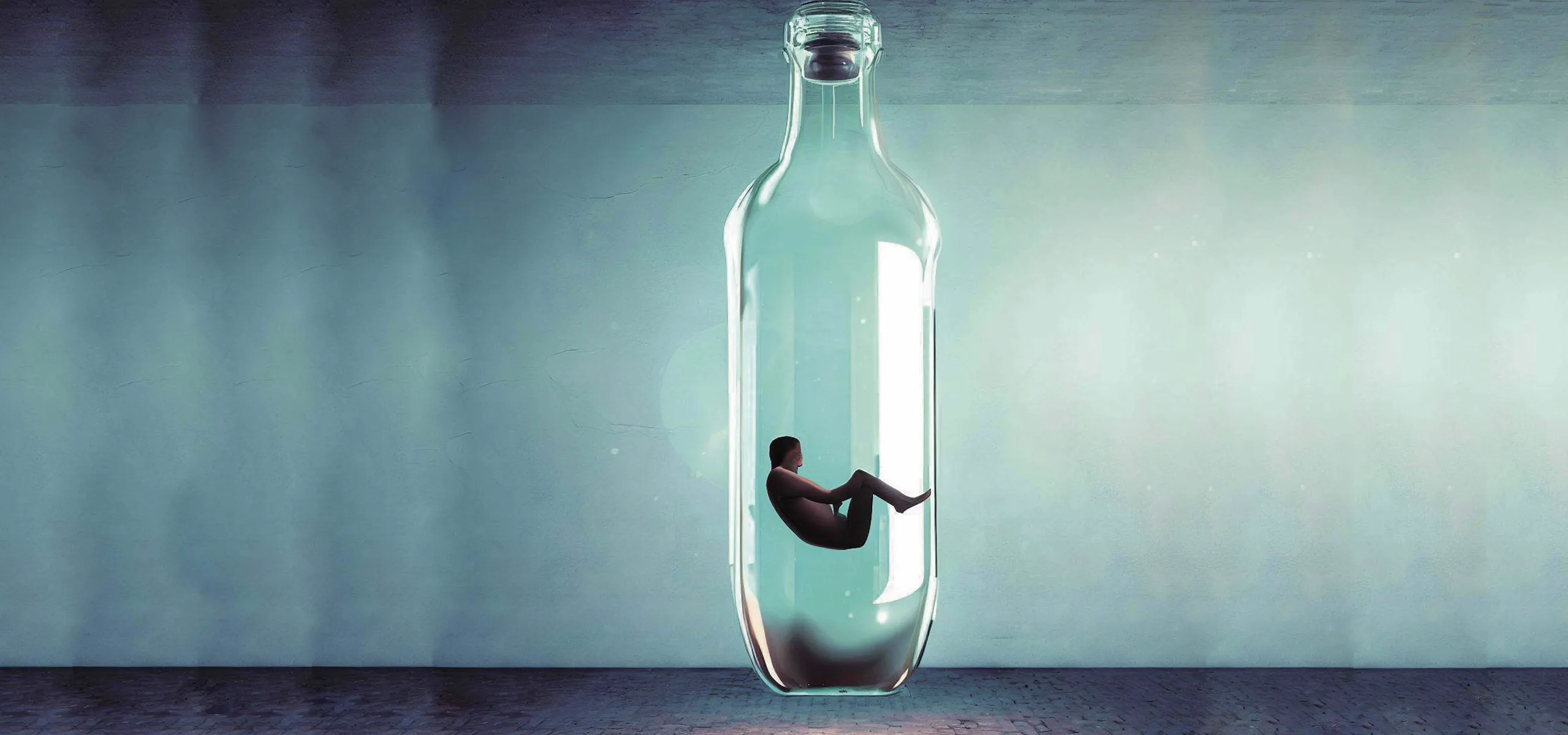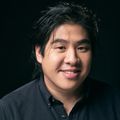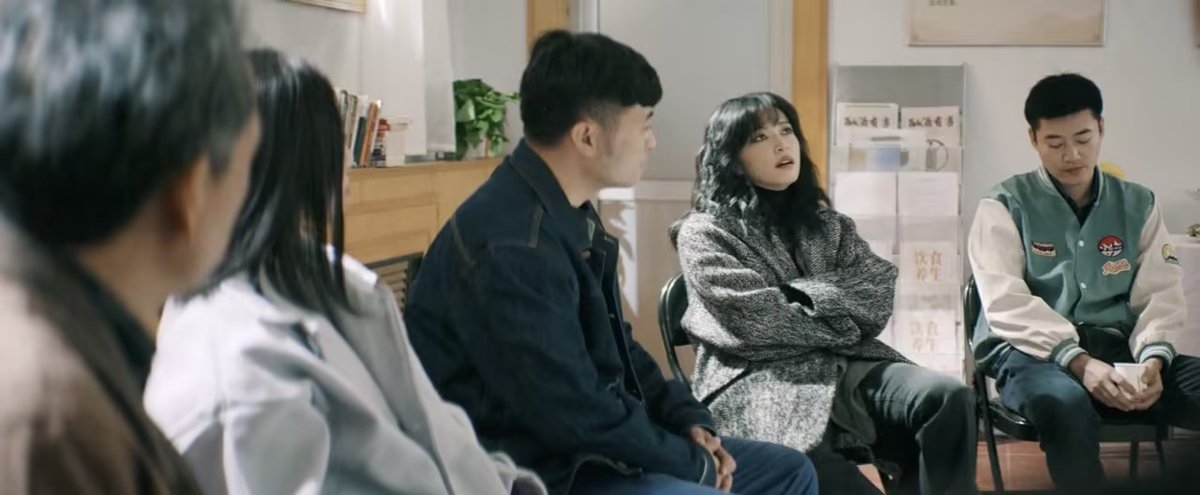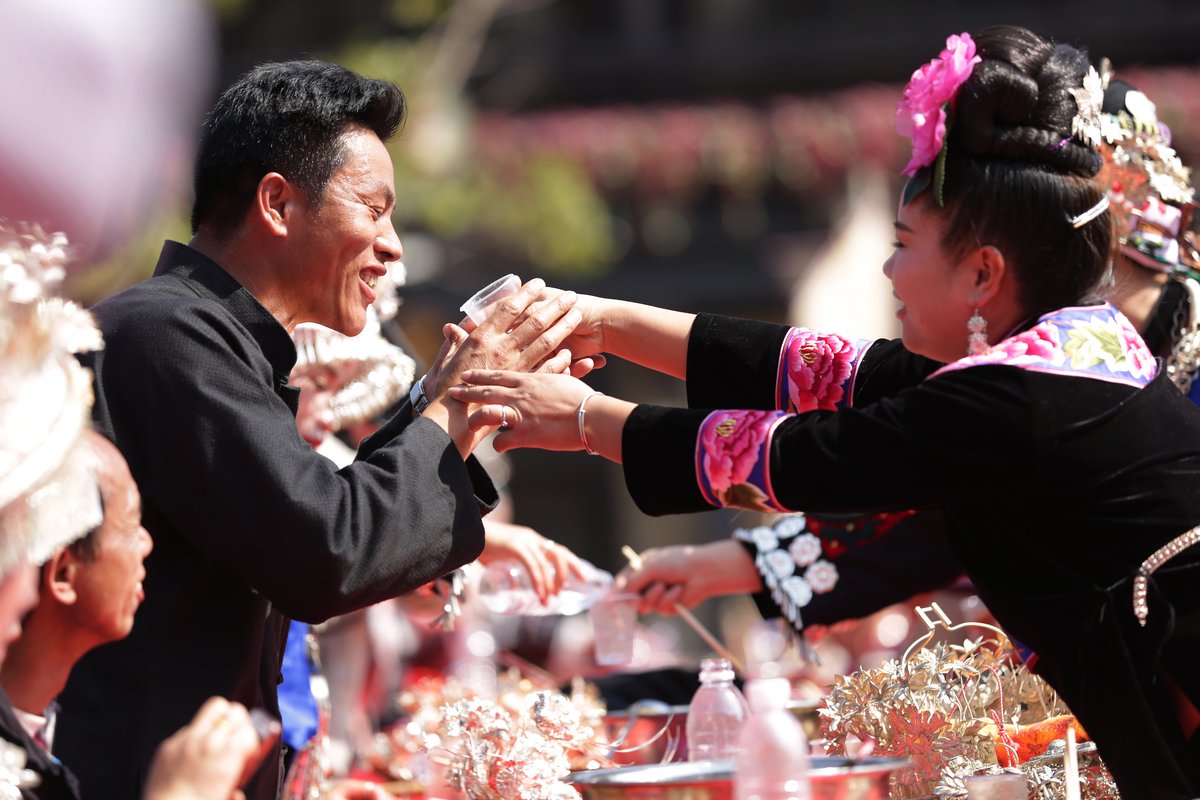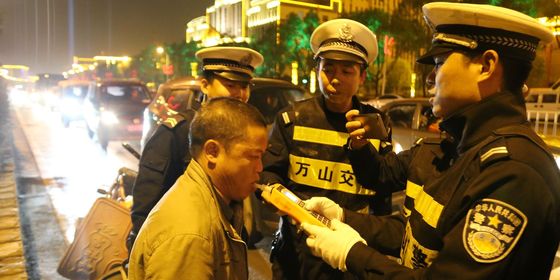At an Alcoholics Anonymous meeting in Beijing, our reporter delves deep into the daily struggles of Chinese alcoholics and the unique cultural pressures leading them to drink
In the myriad of factions that make up the growing melting pot that is Beijing, there is a special group of people who see life through a different lens. Some of them work in business; others are teachers, bankers, managers, mothers, fathers or students. Their Beijing website is a shoddily-managed monochromatic page stamped with the symbolic logo of a triangle inside a square: recovery, unity and service. They are, to each other, both a source of protection as well a reminder of what they struggle against daily.
For members of Alcoholics Anonymous in Beijing, and their counterparts around the country, managing daily life is more than just a struggle against addiction. It is a clash of two different cultures: one that generally recognizes alcoholism as a disease and another that is composed of thousands of years of traditions involving ritual consumption, symbolic meaning and production.
There is somewhat of a clash of ideals in trying to portray the stories and frustrations of AA members here in Beijing: as an organization that values secrecy, AA members in Beijing are understandably nervous about having a journalist on site—especially one with a camera. Sharing their personal troubles, turmoil and pain is a difficult task, made even harder when the veil of privacy that protects their livelihoods is threatened by a strange reporter. At the request of these individuals, all names have been altered to protect their anonymity. What remains are stories of those struggling to stay sober in a country that has an incredibly deep and long-running history of alcohol.
A quiet struggle
Anton is a reserved, polite young man. I found him sitting on the floor outside the AA clubhouse room, disheveled and anxiously shuffling through a stack of HSK study books.
Anton carries himself with an earnestness and candor that can only come from someone who has hit absolute bottom—someone who has realized that living to see another day isn’t a given. As we shook hands and others filtered into the small, chapel-like room, I came to notice that everyone carried themselves with that same warmth of personality, the way one might imagine war time squad mates and brothers in arms meeting after years apart. Anton, William, Kirk, Mason, Andrew, Tatiana—soon there were nearly 20 people. Some milled about, while others put on a pot of coffee and quietly chatted in the kitchen.
The walls of the AA clubhouse are sparsely decorated, save for a few simple posters: “This too, shall pass,” “Let go, Let God,” and their Chinese equivalents “一切都会过去,” “放下执着, 顺其自然.” The messages are simple and transcendent. AA is a non-religious organization, and while religious terminology specific to Christianity can be found in its texts, members are encouraged to reinterpret the text to fit their own lives: Atheists read “God” as G.O.D. or Grand-Ol’-Drunks. At the Chinese AA fellowship, God is replaced with “Higher Being” or 上苍.
“AA is designed to help the most pessimistic, narcissistic people out there—the ones who refuse to believe that anyone else can understand what they’re going through,” says Kirk. “So we don’t push any belief system on anyone. We’re a spiritual organization. No religion.”
A bell rings, and everyone knows the procedure: The preamble is read, as are the Twelve Steps, the basic tenants of AA that every member knows well. There are moments of silence, deep gaps that allow everyone to marinate in the feelings of anxiety, craving and, quite possibly, pain, that are welling up inside them. It is evident in their faces. Anton raises his head. “Hi, I’m Anton, and I’m an alcoholic.”
“Hi Anton,” the room replies.
Just a few days ago, Anton was sitting in a Starbucks in one of Beijing’s smaller neighboring cities. As one of a handful of self-professed foreigners in the entire city, his attention was immediately drawn to the tall, European man in the corner; attached to his arm was a young, attractive Chinese woman. For Anton, this was a point of jealousy and annoyance:
“When living in a place as small and isolated as China’s third-tier cities, you start to notice all those annoying little, small things,” he says, nervously fidgeting with the bundle of books in his arms. Having recently broken up with his girlfriend, his anger boiled over: “Why can’t I ever get with super attractive Chinese girls?”
For most people, struggling with such thoughts doesn’t usually lead them down any particular path, but for Anton, the next thought that crossed his mind was one that he had come to know and realize as the first slip towards something far more sinister and dominating. The thought is: “I need a drink.”
Immediately, Anton got on the nearest train to Beijing, where I would find him, sitting in a corner of the dark hall.
“That was scary,” he bites his lip and shivers. “I just needed to get back here and go back to square one.”
Alcoholism in China
While the Beijing AA fellowship is open to all members, the group tends to split into multiple meetings, for language purposes. Although their formats are similar, there are some major differences in the subject matter.
The greatest difference between the Chinese-language and English-language fellowships I’ve seen is the societal misunderstanding that surrounds their members’ disease and condition. For the most part in China, alcoholism is considered a non-issue: a straw poll on the street will reveal that while most people understand narcotic addictions, they believe alcoholism only affects foreigners.
While this may be a stunning fact, differentiating true alcoholics from weeknight office-party drinkers is difficult because Chinese culture has such a deeply imbedded history with alcohol. Intoxication is often socially-mandated and carries little stigma. With no minimum drinking age in China, some people begin drinking as early as 12 years of age. This innate cultural clash brings about an entirely new level of discrimination and pain. Because of these social pressures, some of the Chinese AA fellows are in far worse condition at their first meeting than their Western counterparts.
Sandy is a tall, skinny Chinese woman. She smiles more and laughs louder than anyone else in the room. Sandy had her first drink as a young girl as a result of academic pressure, stealing her father’s baijiu, or sorghum wine. Drinking alone turned into social drinking, which turned into a deeply-rooted alcohol dependency and a monumental plummet in her finances and social life. Sandy found herself standing on the ledge of a hotel, contemplating suicide.
“My grandfather died from alcohol. As I stood there on the ledge, I just wanted to die—to have the same sweet release that he must have had.” The room laughs, not because it’s funny, but because everyone knows exactly what that was like. This happens a lot at AA meetings. Things that may sound grim or even grotesque usually elicit laughter, but this is how fellows acknowledge and process the things they have done. Often, the harder the laughter, the grimmer the subject.
If there is one commonality that stands out from every story in the Chinese fellowship, it is the shattering of family relationships as a result of the decision to quit drinking. Even after joining AA and sobering up, the troubles did not stop for Sandy and her other Chinese fellows: their stories detail the incredulity and anger of relatives when they refuse to partake in alcohol-related activities. Unlike in many other countries, for these Chinese drinkers, familial troubles start after attaining sobriety.
Wang, another fellow, recounts how angry his father was when he refused a drink of baijiu: “You just have no self-control. How can you not just take one sip!?” For Wang and many of his fellows, their efforts to stay sober have resulted in permanently damaged familial relations: fathers refuse to acknowledge daughters and sons or disavow them altogether, and mothers angrily call to pepper them with “advice” and insults. Wang’s and many other stories highlight just how deeply-rooted conservative drinking culture is in China and how difficult it is for the Chinese to accept the concept of alcoholism as a disease. While AA is growing in China, the fellows may still face inordinate discrimination at home, school, and work for choosing to stay sober.
Just like in the Chinese home, refusing a drink in a business setting is often taken as an insult and is unrelentingly forced. Even after getting sober and moving to China, William often found himself in business functions where the alcohol flowed faster than water. “Even after I’d gotten sober, I’d find myself sitting at a big business banquet and out comes the baijiu and beer and I’d be so stressed. So many times, I came so close to cracking.” Forced consumption of alcohol surrounds the after-hours gatherings of many schools, companies, and organizations, a fact that the recovering members of AA are made even more acutely aware of due to their condition. “You just have to say no,” William asserted, striking his hand across his body with an air of finality.
In spite of this, AA in China has grown substantially since its establishment in the mid-1990s. In the summer of 2000, Beijing chapter members raised enough funding to send a group of Chinese doctors to the 11th international convention of AA in Minneapolis. Their efforts resulted in the creation of institutionalized AA programs in hospitals in large cities, namely Chengdu, Beijing, and Shanghai. According to China Daily, these programs are usually integrated within the hospital’s psychopharmacology or substance dependence wards, and the therapy sessions are used in combination with a range of chemical and psychiatric treatments.
While these institutions have begun to help bring the issue of alcoholism to light, their work is more than cut out for them. As far back as 1992, researchers at Chongqing First Psychiatric Hospital have been pointing to tenfold increases in alcoholism diagnoses in hospital admissions.
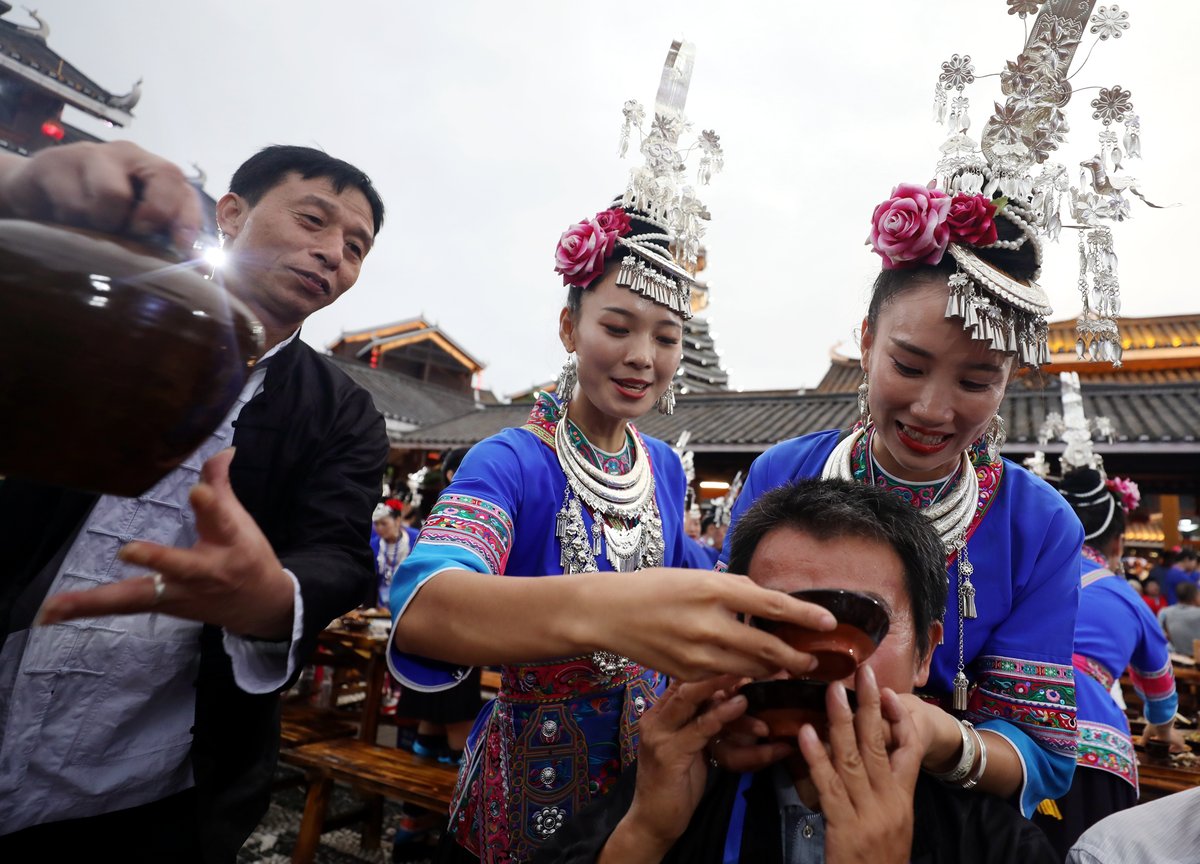
Guests and tourists are fed alcohol at a traditional celebration of the Dong people hosted in the Guangxi region. There has been some pushback against enforced drinking at social events in China in recent years, as a reaction both to extravagance and growing awareness of alcohol addiction, alcohol poisoning, and other dangers (VCG)
Moving Forward
Back at the AA meeting, everyone stands and moves forward to form a circle and join hands in prayer.
“God, grant me the serenity to accept the things I cannot change, the courage to change the things I can, and the wisdom to know the difference.”
To those at the meeting, these words are much more than a mere chant. They are a plea, a symbol of prostration to a higher power to guide them past their own misgivings and flaws. The ease with which the fellows recount their stories reveals so little of the nearly-insurmountable process it took to tell them. For many, it is impossible to even imagine having to come to terms with the fact that, when it comes to certain things, you are literally not in control of yourself: that is the underlying presumption of every member in the room—that they not only cannot control their own bodies, but cannot make their own choices under certain circumstances. Such a fundamentally existential problem might render most eternal narcissists, but the members of AA Beijing share a weary optimism and deep spirituality that uplifts even the most casual observer.
If there is one thing that binds all these people together, it is their shared existence in the here and now. Whether they are sharing the joy of renewing their vigor by remaining sober, their sense of nostalgia for the bottled release they yearn for, or the communal reverence for the great crises through which each of them have passed, their stories convey how deeply entrenched they are in the thoughts, emotions, and feelings of the present. They are open, willing to share their struggles and equally willing to receive the struggles of others, but they expect nothing in return. This is a unique and symbolic paradox of the lives they lead, whether in China or further abroad.
For Anton, William, Kirk, Mason, Sandy, Wang, Andrew, Tatiana, and all the other members of Alcoholics Anonymous, they recognize that, while they are alone in their eternal existential struggle against themselves, they are alone together.
This is a story from our archives. It was originally published in 2013 in our issue “Go Home China, You’re Drunk” and has been lightly edited and updated. Check out our online store for more issues you can buy!





